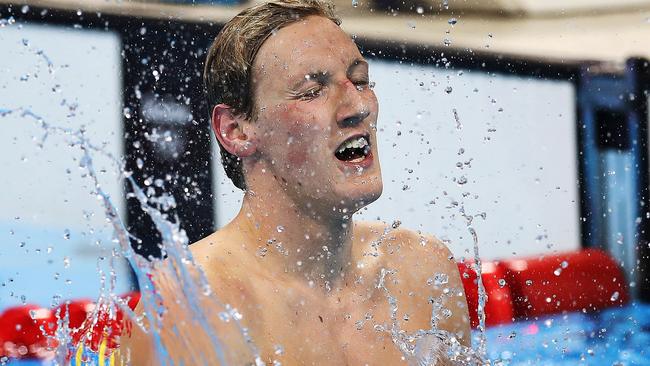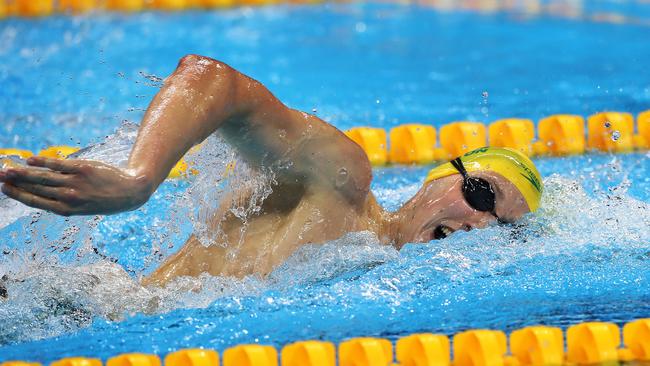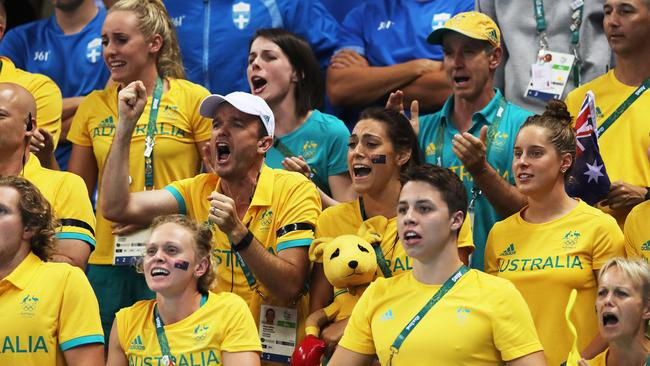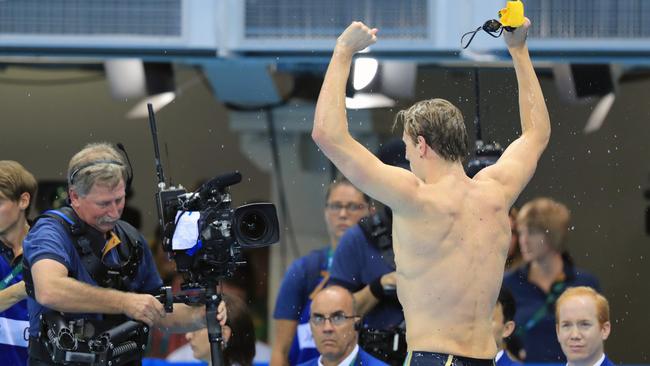Mack Horton the first Victorian swimmer to win an Olympic gold medal
WHEN Mack Horton fought back to win the 400m freestyle final on day one of the Rio Olympics he broke one of the longest droughts in Australian sporting history — and no-one seemed to notice.

WHEN Mack Horton fought back to win the 400m freestyle final on day one of the Rio Olympics he broke one of the longest droughts in Australian sporting history — and no-one seemed to notice.
Horton is the first Victorian male swimmer to win an Olympic gold medal in the Games’ 124-year history, and in doing so he achieved something that evaded two of Australia’s greatest-ever swimmers over a combined five Olympic campaigns.
WHO IS MACK HORTON?Five things you need to know
HORTON v YANG: Aussie labels Chinese star a drug cheat
Frank Beaurepaire and John Marshall both won medals in the 400m and 1500m but despite being recognised as the best swimmers of their eras, for one reason or another, they could not get the elusive gold.
That Horton managed the feat on his first attempt amid a storm of controversy received blanket media coverage but no-one, not even Victorian swimming authorities or the Australian Olympic Committee — who are yet to replace their late historian Harry Gordon — realised it was a first for his state.
It was only when a News Corp journalist checked the record books and contacted the AOC for confirmation that it was discovered, although that is hardly surprising. In the days of YouTube, Instagram and Twitter the exploits and tribulations of Beaurepaire and Marshall have been largely forgotten.

Even so, they remain two of the most successful and influential of all Australian swimmers and paved the way for today’s generation.
Beaurepaire competed at the 1908, 1920 and 1924 Olympics and if not for bureaucracy and war would have swum at two more Games.
In 1908 he arrived to compete in London at the age of 17 and was forced to train in the freezing waters of a public baths. He caught flu but still managed to finish second in the 400m and third in the 1500m. Over the next three years he would not be beaten, setting seven world records and winning every event at the British championships from 100m to 1500m.
In 1911 he took a job as a swimming instructor with the Victorian government and although he was being paid to coach and not compete, he was barred as a professional from competing at the 1912 Olympics. With the Games then abandoned in World War 1 it was not until 1920 in Antwerp that he had another chance for gold.
Having been gassed in the war, he dropped out midway through the 400m because of illness but recovered to win another bronze in the 1500. Four years later, at the age of 36, he captained the Australian team to Paris and won another bronze in the 1500m and silver in the 4x200m relay before retiring. His record of 34 national titles would not be beaten by Susie O’Neill until 2000.
In 1922 Beaurepaire was visiting Sydney’s Coogee beach when a swimmer was attacked by a shark. With a local surf lifesaver he swam out and rescued the young women. In recognition he was awarded the equivalent of $1000, which he used to start up the Beaurepaire tyre company.

In 1948, by then Sir Frank Beaurepaire, Lord Mayor of Melbourne, he was part of the delegation that visited the London Olympics that lobbied successfully for Melbourne to host the 1956 Games.
While in London Beaurepaire was in the stands to witness his fellow Victorian John Marshall winning silver in the 1500m and bronze in the 400m.
Although he was always at his best between Olympics, Marshall is without doubt one of Australia’s greatest swimmers and undisputedly the most influential, because it was through him that Australis swimmers were introduced to the revolutionary modern coaching techniques being introduced in the US.
Leading into the 1948 Olympics Marshall had dominated the Australian titles, and in London so impressed innovative US coach Bob Kiphuth that he arranged for him to study at Yale University and swim under his coaching.
Their partnership resulted in 19 world records and domination in all distances from 100m to 1500m — also left Marshall a burnt out swimmer at the 1952 Olympics where he failed to make the final of the 400m and finished last in the 1500m. He retired but was lured back by a job offer from Frank Beaurepaire and the opportunity to swim in front of his home crowd.

Realising that he would no longer have the speed to compete as a freestyler, he changed to the new Olympic event of butterfly and qualified at the age of 26, finishing fifth in the final.
Beaurepaire had envisaged officiating at the opening of the 1956 Olympics as one of the greatest moment of his life, but it was not to be. Seven months before the Games came to Melbourne he suffered a heart attack and died in a barber chair at the age of 65.
Tragically, John Marshall was also to die just a few weeks after the Games, killed in a car accident. He was aged 26, but his legacy lives on.
When he returned from the US, Marshall brought with him a copy of Bob Kiphuth’s coaching manual. It became the bible of Australian swimming and led directly to the production line that is still turning out Olympic champions — the latest being Mack Horton. Victorian.
Originally published as Mack Horton the first Victorian swimmer to win an Olympic gold medal



